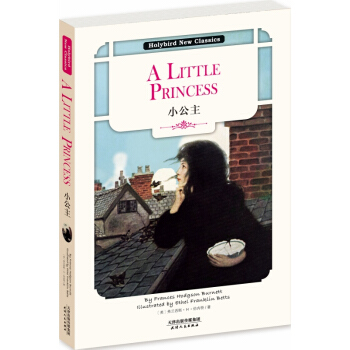

具体描述
编辑推荐
《小公主》自1905年头次出版以来,一百多年间多次再版,流传于*世界,并多次被搬上银幕舞台。一个多世纪以来,一直是*世界家庭为陶冶子女情操必备的经典文学读物。由小说改编的同名电影,曾由好来坞 童星秀兰·邓波儿出演,风靡*球。本书为英文原版,同时随书附赠配套朗读CD,让读者在阅读精彩故事的同时,亦能提升英文阅读水平。内容简介
《小公主》主要描述了小主人公英国女孩萨拉·克鲁在其父亲去世前后的生活。父亲去世前,她生活条件优越。克鲁上尉把女儿送到一所贵族学校,学校校长蝎尽*力为萨拉提供一切。她成了学校的“招牌学生”,从内向外都散发着公主的气息。克鲁上尉去世后,势力的校长把她赶到小阁楼,还要她干各种各样的杂活。对于生活的变故,周围同学的冷眼以及各种折磨,萨拉都以乐观的心态面对。即便衣衫槛楼,但她内心却表现得像个公主。本书自1905年头次出版后,一百多年来一版再版,流传于*世界,并多次被搬上银幕舞台。一个多世纪以来,一直是*世界家庭为陶冶子女情操必备的经典文学读物。由小说改编的同名电影,曾由好来坞 童星秀兰·邓波儿出演,风靡*球。本书为英文原版,同时随书附赠配套朗读CD,让读者在阅读精彩故事的同时,亦能提升英文阅读水平。 A Little Princess is a British children's novel by Frances Hodgson Burnett, first published as a book in 1905. It is an expanded version of Burnett's 1888 short story entitled Sara Crewe : or, What Happened at Miss Minchin's, which was serialized in St. Nicholas Magazine from 1887 to 1888. A Little Princess is full of good, strong female characters, and shows its readers that being a princess isn’t about being beautiful rich daughter of a king, trapped in a castle, waiting for her prince. It’s about being a virtuous, kind and generous person, no matter what your circumstances. Based on a 2007 online poll, the U. S. National Education Association named the book one of its “Teachers’ Top 100 Books for Children”. In 2012 it was ranked number 56 among all-time children’s novels in a survey published by School Library Journal. It was the second of two Burnett novels among the Top 100, with The Secret Garden number 15.作者简介
弗兰西斯·H·伯内特,1849年生于英国曼彻斯特市,1865年随*家移民美国田纳西州。伯内特的父亲早逝,家境贫寒,写作成了她抒发情感、逃避现实的管道,也由于她在小说创作方面有着出色的表现,18岁起她便开始在杂志上发表故事,赚取稿费贴补家用。她的*一本畅销书是28岁时出版的《劳瑞家的那闺女》(That Lass O’Lowries),取材于幼年她在英国煤矿的生活。可是,真正让伯内特闻名于世的是她的儿童文学作品。1886年她发表了小说《小爵士》,这部小说写的是一个美国小男孩成为英国伯爵继承人的故事。“方特罗伊”从此成为英语词汇,指“过分盛装打扮的小孩”。这本书让伯内特成为当时畅销、*富有的流行作家之一。此书和1905年发表的《小公主》都曾被改编成话剧。1939年,电影《秘密花园(小孤女)》和《小公主》由当时红*一时的童星秀兰·邓波儿(Sherley Temper)主演。内页插图
目录
Chapter 1 Sara /1Chapter 2 A French Lesson /11
Chapter 3 Ermengarde /17
Chapter 4 Lottie /24
Chapter 5 Becky /33
Chapter 6 The Diamond Mines /43
Chapter 7 The Diamond Mines Again /53
Chapter 8 In the Attic /73
Chapter 9 Melchisedec /83
Chapter 10 The Indian Gentleman /94
Chapter 11 Ram Dass /106
Chapter 12 The Other Side of the Wall /115
Chapter 13 One of the Populace /123
Chapter 14 What Melchisedec Heard and Saw /133
Chapter 15 The Magic /138
Chapter 16 The Visitor /161
Chapter 17 “It Is the Child!” /176
Chapter 18 “I Tried Not to Be” /183
Chapter 19 Anne /194
精彩书摘
Once on a dark winter’s day, when the yellow fog hung so thick and heavy in the streets of London that the lamps were lighted and the shop windows blazed with gas as they do at night, an oddlooking little girl sat in a cab with her father and was driven rather slowly through the big thoroughfares.She sat with her feet tucked under her, and leaned against her father, who held her in his arm, as she stared out of the window at the passing people with a queer old-fashioned thoughtfulness in her big eyes.
She was such a little girl that one did not expect to see such a look on her small face. It would have been an old look for a child of twelve, and Sara Crewe was only seven. The fact was, however, that she was always dreaming and thinking odd things and could not herself remember any time when she had not been thinking things about grown-up people and the world they belonged to. She felt as if she had lived a long, long time.
At this moment she was remembering the voyage she had just made from Bombay with her father, Captain Crewe. She was thinking of the big ship, of the Lascars passing silently to and fro on it, of the children playing about on the hot deck, and of some young officers’ wives who used to try to make her talk to them and laugh at the things she said.
Principally, she was thinking of what a queer thing it was that at one time one was in India in the blazing sun, and then in the middle of the ocean, and then driving in a strange vehicle through strange streets where the day was as dark as the night. She found this so puzzling that she moved closer to her father.
“Papa,” she said in a low, mysterious little voice which was almost a whisper, “papa.”
“What is it, darling?” Captain Crewe answered, holding her closer and looking down into her face. “What is Sara thinking of?”
“Is this the place?” Sara whispered, cuddling still closer to him.
“Is it, papa?”
“Yes, little Sara, it is. We have reached it at last.” And though she was only seven years old, she knew that he felt sad when he said it.
It seemed to her many years since he had begun to prepare her mind for “the place,” as she always called it. Her mother had died when she was born, so she had never known or missed her. Her young, handsome, rich, petting father seemed to be the only relation she had in the world. They had always played together and been fond of each other. She only knew he was rich because she had heard people say so when they thought she was not listening, and she had also heard them say that when she grew up she would be rich, too. She did not know all that being rich meant. She had always lived in a beautiful bungalow, and had been used to seeing many servants who made salaams to her and called her “Missee Sahib,” and gave her her own way in everything. She had had toys and pets and an ayah who worshipped her, and she had gradually learned that people who were rich had these things. That, however, was all she knew about it.
During her short life only one thing had troubled her, and that thing was “the place” she was to be taken to some day. The climate of India was very bad for children, and as soon as possible they were sent away from it—generally to England and to school. She had seen other children go away, and had heard their fathers and mothers talk about the letters they received from them. She had known that she would be obliged to go also, and though sometimes her father’s stories of the voyage and the new country had attracted her, she had been troubled by the thought that he could not stay with her.
“Couldn’t you go to that place with me, papa?” she had asked when she was five years old. “Couldn’t you go to school, too? I would help you with your lessons.”
“But you will not have to stay for a very long time, little Sara,” he had always said. “You will go to a nice house where there will be a lot of little girls, and you will play together, and I will send you plenty of books, and you will grow so fast that it will seem scarcely a year before you are big enough and clever enough to come back and take care of papa.”
She had liked to think of that. To keep the house for her father; to ride with him, and sit at the head of his table when he had dinner parties; to talk to him and read his books—that would be what she would like most in the world, and if one must go away to “the place” in England to attain it, she must make up her mind to go. She did not care very much for other little girls, but if she had plenty of books she could console herself. She liked books more than anything else, and was, in fact, always inventing stories of beautiful things and telling them to herself. Sometimes she had
told them to her father, and he had liked them as much as she did.
“Well, papa,” she said softly, “if we are here I suppose we must be resigned.”
He laughed at her old-fashioned speech and kissed her. He was really not at all resigned himself, though he knew he must keep that a secret. His quaint little Sara had been a great companion to him, and he felt he should be a lonely fellow when, on his return to India, he went into his bungalow knowing he need not expect to see the small figure in its white frock come forward to meet him. So he held her very closely in his arms as the cab rolled into the big, dull square in which stood the house which was their destination.
……
前言/序言
I do not know whether many people realize how much more than is ever written there really is in a story—how many parts of it are never told—how much more really happened than there is in the book one holds in one’s hand and pores over. Stories are something like letters. When a letter is written, how often one remembers things omitted and says, “Ah, why did I not tell them that?” In writing a book one relates all that one remembers at the time, and if one told all that really happened perhaps the book would never end. Between the lines of every story there is another story, and that is one that is never heard and can only be guessed at by the people who are good at guessing. The person who writes the story may never know all of it, but sometimes he does and wishes he had the chance to begin again.
When I wrote the story of “Sara Crewe” I guessed that a great deal more had happened at Miss Minchin’s than I had had time to find out just then. I knew, of course, that there must have been chapters full of things going on all[vi] the time; and when I began to make a play out of the book and called it “A Little Princess,” I discovered three acts full of things. What interested me most was that I found that there had been girls at the school whose names I had not even known before. There was a little girl whose name was Lottie, who was an amusing little person; there was a hungry scullery-maid who was Sara’s adoring friend; Ermengarde was much more entertaining than she had seemed at first; things happened in the garret which had never been hinted at in the book; and a certain gentleman whose name was Melchisedec was an intimate friend of Sara’s who should never have been left out of the story if he had only walked into it in time. He and Becky and Lottie lived at Miss Minchin’s, and I cannot understand why they did not mention themselves to me at first. They were as real as Sara, and it was careless of them not to come out of the story shadowland and say, “Here I am—tell about me.” But they did not—which was their fault and not mine. People who live in the story one is writing ought to come forward at the beginning and tap the writing person on the shoulder and say, “Hallo, what about me?” If they don’t, no one can be blamed but themselves and their slouching, idle ways.
After the play of “A Little Princess” was produced in New York, and so many children went to see it and liked Becky and Lottie and Melchisedec, my publishers asked[vii] me if I could not write Sara’s story over again and put into it all the things and people who had been left out before, and so I have done it; and when I began I found there were actually pages and pages of things which had happened that had never been put even into the play, so in this new “Little Princess” I have put all I have been able to discover.
FRANCES HODGSON BURNETT
用户评价
从文学价值的角度来看,这本书无疑是一部里程碑式的作品。它的叙事结构严谨,主题深刻,成功地将社会阶层的差异、女性的成长以及道德的坚守等宏大命题,融入了一个孩子的故事之中。我最欣赏的是,作者并没有将主角塑造成一个完美无瑕的圣人,她也有年少气盛的时候,但正是那些不完美,让她显得更加真实可爱。书中关于友谊的描写也格外动人,那种患难与共的情谊,比锦上添花的友谊要来得更加珍贵和有分量。每当读到主角为朋友挺身而出,或者在孤独时得到意想不到的善意援手,都会让我眼眶湿润。这本书的成功之处在于,它能够跨越时代和文化的鸿沟,触及人类最基本的情感需求——被爱、被尊重和有尊严地活着。它成功地构建了一个充满温情和挑战的世界,让人在合上书本后,依然能感受到那份挥之不去的温暖和力量。
评分阅读体验上,这本书的语言风格非常独特,它有一种老派的英式优雅,措辞考究,句子结构复杂却又流畅自然。我花了些时间才完全适应这种略显繁复的叙事方式,但一旦适应了,那种文字构建出来的世界就变得无比鲜活起来。作者似乎非常擅长捕捉人物微妙的心理变化,那些隐藏在礼貌言辞下的挣扎、骄傲与失落,都通过极其精准的词汇被刻画得入木三分。比如主角在面对突如其来的变故时,她是如何努力维持住她“公主”般的风范,那份强撑的体面背后,其实是巨大的勇气。我注意到书中对于环境的描写也极其到位,无论是那个充满想象力的游乐园,还是后来那个阴冷简朴的住所,都通过环境的对比,反衬出人物命运的起伏。这本书的节奏把握得非常好,高潮和低谷之间的过渡处理得非常自然,没有那种突兀的戏剧化,一切都像是生活中必然会发生的那样,真实而又引人深思。
评分这本书的封面设计真是太引人注目了,那种古典的插画风格,带着一丝丝怀旧的温馨感,让人立刻就想翻开它。我尤其喜欢那种泛黄的纸张质感,拿在手里沉甸甸的,仿佛真的触摸到了那个遥远的维多利亚时代的空气。每一次翻页,都能感受到作者在文字中倾注的细腻情感。这本书的内容虽然是面向年轻读者的,但它所探讨的主题,比如坚韧、善良以及面对困境时的优雅,即便是成年人读来,也深受触动。它不像那些充斥着快速情节发展的现代小说,而是更注重人物内心的成长和环境的渲染,那种慢节奏的叙事反而让人更能沉浸其中,细细品味每一个场景的描绘。我记得书中对那个小小的阁楼房间的描写,那种从奢华到清贫的巨大落差,被作者描绘得既心酸又充满了希望,让人在为主角感到不公的同时,又为她那份不屈的精神而喝彩。总的来说,这是一本值得反复阅读的经典,它提供的不仅仅是一个故事,更是一种面对生活的态度和力量。
评分我必须承认,这本书初读时,那种叙事上的沉稳可能会让习惯了快节奏小说的读者感到一丝不耐烦。然而,正是这种娓娓道来的方式,才使得人物的形象如此立体丰满。那些配角,即便是戏份不多的,也被赋予了鲜明的性格烙印,让人过目不忘。我尤其欣赏作者对于“想象力”在困境中作用的刻画,它不仅仅是一种逃避现实的手段,更是一种内在的支撑和力量的源泉。主角从未真正放弃过自我,她通过内心世界的构建,在最黑暗的时刻也保持着一份高贵。这种精神层面的富足,是任何物质财富都无法取代的。这本书的魅力在于,它教导我们,真正的尊严和价值并非由外在地位决定,而是源于内心的坚守。每一次重读,我都会有新的感悟,发现之前可能被快速略过的细节,现在看来却是点睛之笔,体现了作者深厚的文学功底和对人性的洞察。
评分这本书的翻译版本(如果涉及的话,这里我评价其英文原版的语感)保留了原著非常独特的语感和韵律,读起来有一种在聆听一位经验丰富的老者讲述往事的沉稳感。虽然有些古老的词汇需要查阅,但这反而增加了阅读的仪式感和探索的乐趣。我喜欢作者在描绘人物情感时那种克制而又饱满的笔触,它不像现代小说那样直白地剖开情绪,而是通过行动和环境侧面烘托,让读者自己去体会那种情感的深度。比如,主角面对逆境时的那些“小小的胜利”——一次得体的回答,一次坚持不懈的努力,都像钻石的微光一样,在黑暗中闪耀着希望。这本书的魅力是复合型的,它既有童话般的美好想象,又有对现实残酷的深刻揭示,两者结合得恰到好处,达到了艺术上的平衡。它不仅仅是给孩子看的睡前故事,更是一部关于如何保有赤子之心去面对成人世界的教科书。
评分陪娃学习,天天向上。
评分好哈哈哈红红火火恍恍惚惚哈哈哈哈
评分很喜欢这些书,值得入手。比想象中的棒
评分开始以为是漫画书,买了给宝贝看的,结果是全英文的,只能自己先看了。质量不错!
评分很好很好哈哈哈哈哈哈哈哈哈哈哈哈哈很好很好哈
评分不错哦 看起来挺高大上的 喜欢 价格优惠
评分很好,很快就到货了!信赖京东商城购物,值得购买!
评分啦啦啦啦啦啦啦,送给有童心的我 ヘ(⊙ω⊙ヘ)哈。
评分已收到 挑战一下 提高自己的英语水平
相关图书
本站所有内容均为互联网搜索引擎提供的公开搜索信息,本站不存储任何数据与内容,任何内容与数据均与本站无关,如有需要请联系相关搜索引擎包括但不限于百度,google,bing,sogou 等
© 2026 book.idnshop.cc All Rights Reserved. 静思书屋 版权所有

![小王子+老人与海+动物庄园 全英文原版经典名著系列读物(套装共3册) [The Little Prince+The Old Man and the Sea+Animal F] pdf epub mobi 电子书 下载](https://pic.tinynews.org/12009585/5a06d801N04a6e901.jpg)
![傲慢与偏见+海底两万里全英文版/世界经典文学名著系列 昂秀书虫(套装共2册) [Twenty Thousand Leagues Under the Sea+ Pride and P] pdf epub mobi 电子书 下载](https://pic.tinynews.org/12044943/5a0cececN6f8ade1b.jpg)

![小王子+动物庄园 全英文版 世界经典文学名著系列(套装2册) [The Little Prince+Animal Farm] pdf epub mobi 电子书 下载](https://pic.tinynews.org/11990259/5a0cf54fN38bec0ba.jpg)
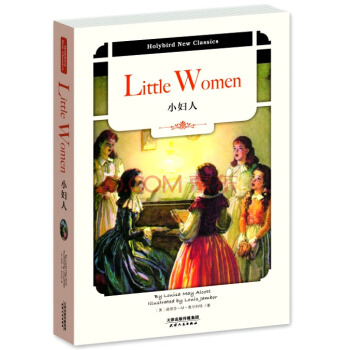
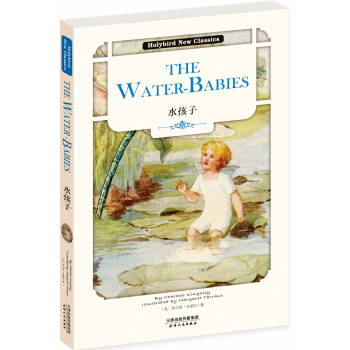


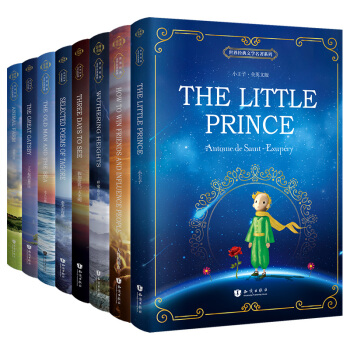
![了不起的盖茨比+老人与海+假如给我三天光明+一九八四(套装共4册 全英文版)/世界经典文学名著系列 [The Great Gatsby+The Old Man and the Sea+Three Day] pdf epub mobi 电子书 下载](https://pic.tinynews.org/12160516/58f86000N3ce4828e.jpg)
![小王子+老人与海/全英文原版经典名著系列读物(套装共2册)昂秀书虫 [The Little Prince+ The Old Man and the Sea] pdf epub mobi 电子书 下载](https://pic.tinynews.org/12062508/581aecc7N78331f62.jpg)

![世界经典文学名著系列:简爱+1984+呼啸山庄+海底两万里+傲慢与偏见(套装共5册 全英文版) [Jane Eyre+Nineteen Eighty-Four +Wuthering Heights+] pdf epub mobi 电子书 下载](https://pic.tinynews.org/12057135/58db1e45N6b78ac39.jpg)
![了不起的盖茨比+呼啸山庄+傲慢与偏见(套装共3册)全英文版 世界经典文学名著系列 [The Great Gatsby +Wuthering Heights+Pride and Prej] pdf epub mobi 电子书 下载](https://pic.tinynews.org/12102181/59dc609fN2ac23b4b.jpg)
![小王子+了不起的盖茨比(共2册)全英文版 世界经典文学名著系列 昂秀书虫 [The Little Prince+ The Great Gatsby] pdf epub mobi 电子书 下载](https://pic.tinynews.org/12009533/582bec87N24284345.jpg)
![假如给我三天光明+小王子+老人与海(套装共3册)全英文版 世界经典文学名著系列 [Three Days to See+The Little Prince+The Old Man an] pdf epub mobi 电子书 下载](https://pic.tinynews.org/12102187/5a0cf072N4448e7e2.jpg)
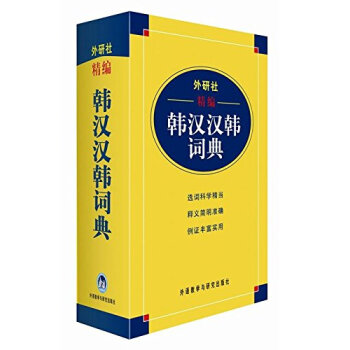

![世界经典文学名著系列:简爱+1984 +傲慢与偏见(套装共3册 全英文版) [Jane Eyre+Nineteen Eighty-Four + ride and Prejudic] pdf epub mobi 电子书 下载](https://pic.tinynews.org/12058821/5a0cf1e8N398e86bb.jpg)
